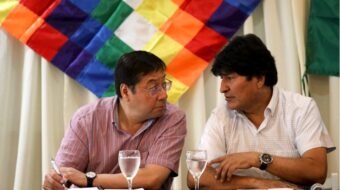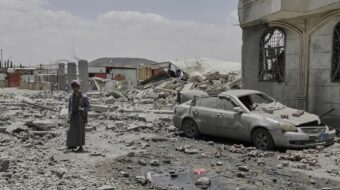Abridged from a letter to Inter-American Dialogue, a Washington-based thinktank, by Venezuela’s ambassador to the U.S. The full text is available at .
Thank you for inviting me to participate in the discussion on U.S. policy towards Venezuela. I read with great interest Inter-American Dialogue’s most recent report on Venezuela, “Hugo Chávez: A Test for U.S. Policy.” After careful consideration, I have decided to respectfully decline your invitation. I hope to elucidate the reasons why.
Venezuela is in the midst of a dramatic political, economic and social reorganization that aims to create a system of government and economy that more fully incorporates its citizens, creates the bases for a sustainable economy and ensures an equitable distribution of the country’s resources and riches. This is a homegrown effort and responds to Venezuela’s history and conditions — a significant break for a region that historically adopted foreign models. The Venezuelans conducting these changes have done so in peace and within the bounds of democracy.
Your report simply does not recognize that what is taking place in Venezuela can only be understood through new and emerging concepts. Such concepts include participatory democracy, communal councils and what we have labeled “social economics.”
Your report leaves the reader with the impression that there are no alternatives to the liberal organization of political, economic and social forces promoted by Washington. This is precisely the kind of thinking that has led to so many developmental failures in the past. Where would the U.S. be today if it had not adjusted its social organization to its emerging realities and challenges since independence? The U.S. has shown that societies that do not adapt to changing conditions are doomed to failure. This has been true in our lifetime with Franklin Delano Roosevelt’s New Deal, the civil rights movement and Lyndon Johnson’s Great Society, among many examples.
We in Venezuela are adjusting and adapting to our changing realities. What is happening in Venezuela has given the Venezuelan people hope for the future.
Most analysts and policymakers in Washington have looked at Venezuela through the prism of U.S. interests and assumptions, in the process identifying President Chávez as a threat. This is a mistake. Sen. Barack Obama (D-Ill.) expressed as much when he commented on President George W. Bush’s trip to Latin America, stating, “The president and his administration have misunderstood and mismanaged the political, economic and social change occurring through the Americas. … It is vital to reverse that trend.”
Recent years have seen a whole host of new social movements and leaders rise to power in Latin America, products of decades of closed political systems and inequitable economic policies. Governments like President Chávez’s have undertaken substantive and far-reaching actions to incorporate entire classes of citizens that had until recently been excluded. Regionally, many countries have come to a consensus that development can only come through integration based on solidarity and cooperation. U.S. policy has never caught up with these changes.
The report is based on the underlying assumption that U.S. interests are the same as the region’s interests. The report states that President Chávez is committed to “constructing a broad alliance in opposition to the U.S. agenda in Latin America and the world.” Although I respect the honesty of the report in admitting that the U.S. first and foremost responsibility is to defend its national interest, it implicitly assumes that Venezuela’s national interest should be an extension of it. The assumption remains that somehow the “U.S. agenda” parallels other national, regional and global agendas. I respectfully disagree. What my government has done is to design a foreign policy which promotes the sovereignty of Venezuela and our right to self-determination as well as Venezuela’s national and strategic interests. These include a different conception of regional integration that will allow South America to deal with other regions of the world — including the U.S., of course — as a united front. Venezuela has been willing to redefine its national interest to pursue regional integration and cooperation in pursuit of a multipolar world.
If we want to remain true to the concept of the inter-American system, the U.S. agenda should focus more on cooperating with its partners, not dictating U.S. interests to them and demanding that they follow along. For the last six years, President Bush has pushed an aggressive and unilateral foreign policy, rarely stopping to listen to what his global partners and their people were saying.
As the ambassador of a country that democratically seeks a re-conceptualization of societal relations and a multipolar world, it would be inappropriate for me to participate in any discussion in which the national interests of the U.S. is the only item on the agenda. If the day comes for a true dialogue, one in which there is a real discussion on some of the real social, political and economic changes affecting my country and the many interdependent interests represented in the Inter-American system, I would be more than happy to participate.









